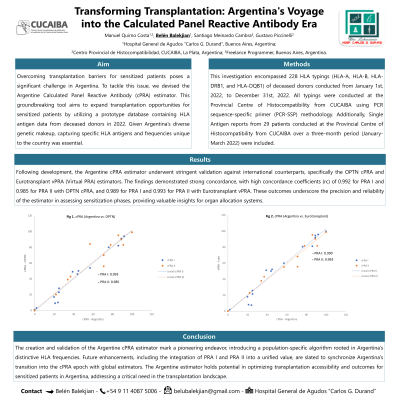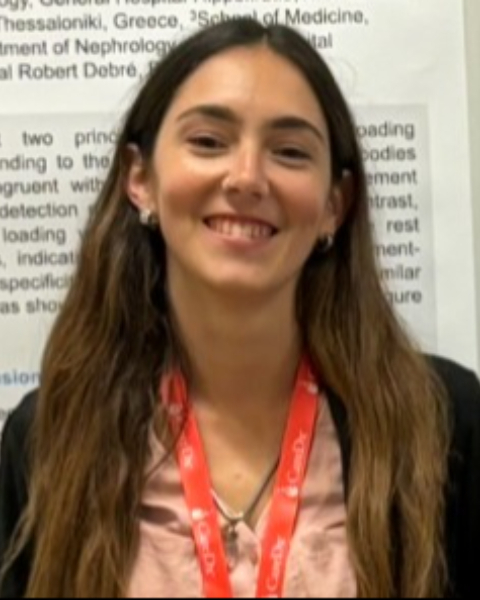Transforming Transplantation: Argentina's Voyage into the Calculated Panel Reactive Antibody Era
(P115) Transforming transplantation
Location: Platinum Ballroom

Poster Presenter(s)
Aim: Overcoming transplantation barriers for sensitized patients poses a significant challenge in Argentina. To tackle this issue, we devised the Argentine Calculated Panel Reactive Antibody (cPRA) estimator. This groundbreaking tool aims to expand transplantation opportunities for sensitized patients by utilizing a prototype database containing HLA antigen data from deceased donors in 2022. Given Argentina's diverse genetic makeup, capturing specific HLA antigens and frequencies unique to the country was essential.
Method: This investigation encompassed 228 HLA typings (HLA-A, HLA-B, HLA-DRB1, and HLA-DQB1) of deceased donors conducted from January 1st, 2022, to December 31st, 2022. All typings were conducted at the Provincial Centre of Histocompatibility from CUCAIBA using PCR sequence-specific primer (PCR-SSP) methodology. Additionally, Single Antigen reports from 29 patients conducted at the Provincial Centre of Histocompatibility from CUCAIBA over a three-month period (January-March 2022) were included.
Results: Following development, the Argentine cPRA estimator underwent stringent validation against international counterparts, specifically the OPTN cPRA and Eurotransplant vPRA (Virtual PRA) estimators. The findings demonstrated strong concordance, with high concordance coefficients (rc) of 0.992 for PRA I and 0.985 for PRA II with OPTN cPRA, and 0.989 for PRA I and 0.993 for PRA II with Eurotransplant vPRA. These outcomes underscore the precision and reliability of the estimator in assessing sensitization phases, providing valuable insights for organ allocation systems.
Conclusion: The creation and validation of the Argentine cPRA estimator mark a pioneering endeavor, introducing a population-specific algorithm rooted in Argentina's distinctive HLA frequencies. Future enhancements, including the integration of PRA I and PRA II into a unified value, are slated to synchronize Argentina's transition into the cPRA epoch with global estimators. The Argentine estimator holds potential in optimizing transplantation accessibility and outcomes for sensitized patients in Argentina, addressing a critical need in the transplantation landscape.
Method: This investigation encompassed 228 HLA typings (HLA-A, HLA-B, HLA-DRB1, and HLA-DQB1) of deceased donors conducted from January 1st, 2022, to December 31st, 2022. All typings were conducted at the Provincial Centre of Histocompatibility from CUCAIBA using PCR sequence-specific primer (PCR-SSP) methodology. Additionally, Single Antigen reports from 29 patients conducted at the Provincial Centre of Histocompatibility from CUCAIBA over a three-month period (January-March 2022) were included.
Results: Following development, the Argentine cPRA estimator underwent stringent validation against international counterparts, specifically the OPTN cPRA and Eurotransplant vPRA (Virtual PRA) estimators. The findings demonstrated strong concordance, with high concordance coefficients (rc) of 0.992 for PRA I and 0.985 for PRA II with OPTN cPRA, and 0.989 for PRA I and 0.993 for PRA II with Eurotransplant vPRA. These outcomes underscore the precision and reliability of the estimator in assessing sensitization phases, providing valuable insights for organ allocation systems.
Conclusion: The creation and validation of the Argentine cPRA estimator mark a pioneering endeavor, introducing a population-specific algorithm rooted in Argentina's distinctive HLA frequencies. Future enhancements, including the integration of PRA I and PRA II into a unified value, are slated to synchronize Argentina's transition into the cPRA epoch with global estimators. The Argentine estimator holds potential in optimizing transplantation accessibility and outcomes for sensitized patients in Argentina, addressing a critical need in the transplantation landscape.

